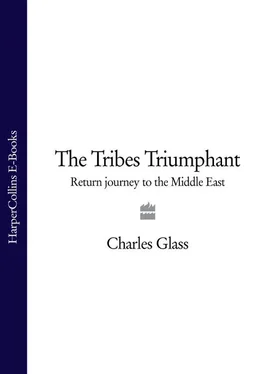The best book in English on the Nabataeans – the book that made me appreciate their achievement – was The Lost Civilisation of Petra by an Israeli who had fought in court to erase the classification ‘Jew’ from his identity card. He was the father of Juwal Levy, the young man my son and I had met aboard the Nissos Kypros. Udi Levy was, although he did not know it, waiting at home in the Negev to show me the rest of the Nabataean empire.
Amman was dark by the time we reached its outskirts. Thrown like a Bedouin blanket over a batch of hilltops, the city had outgrown the Circassian village where Prince Abdallah of the Hejaz pitched camp in March 1921. Abdallah had embarked on a quixotic mission to restore his brother Feisal’s throne in Damascus after France had massacred Feisal’s Arab army at the Maysaloun Pass and robbed the Arabs of their independent state. Abdallah’s adventure, if allowed to proceed, threatened war between Britain and France. Winston Churchill, by then colonial secretary, persuaded Abdallah to accept a principality to be called Transjordan with its capital in Amman. This involved compromises for Abdallah, who must have known the French would annihilate his Bedouin troops; for the Arabs of Greater Syria, a vast majority of whom had told the American King – Crane Commission of their desire for independence and unity; and for the Zionists, whose territorial ambitions included both banks of the Jordan. Until then, Britain and its Zionist protégés had called the country Eastern Palestine. Britain revised its League of Nations Mandate in 1922 to exclude the East Bank from the Balfour Declaration’s proposed ‘Jewish home’. It assumed responsibility for Prince Abdallah’s foreign policy and, under the able direction of General John Bagot Glubb, organized his army into the Arab Legion. Zionists who rejected the revision of the Mandate and insisted the future Israel comprise both banks of the River Jordan came to be called the Revisionists. Its leaders would be Vladimir Jabotinsky, Menachem Begin, Yitzak Stern, Yitzak Shamir and, later, Ariel Sharon.
Jordan, removed from the Palestine Mandate, did not escape the Palestine problem. Half of the lighted hilltops of night-time Amman belonged to Palestinians, whose refugee camps were as much a part of the city, albeit poorer, as the East Bankers’ neighbourhoods. Jordan had fought three wars over Palestine. In 1948, Abdallah – who became king of independent Jordan in 1946 – captured East Jerusalem and the West Bank. In 1967, his grandson, King Hussein, lost Abdallah’s 1948 conquests. In both wars, Jordan absorbed refugees whom the Israeli army had expelled. Then came the third war. The refugees, led by Yasser Arafat, and the native Jordanians under King Hussein waged ferocious battles in 1970 and 1971. The Palestinians lost, and the Hashemite throne survived.
The city we entered had grown to include a million people on the hills where Abdallah had found about three thousand Circassian settlers and a few hundred Arabs. At one of Amman’s many traffic roundabouts, twenty young men were dancing in a large plaza. Clasping one another’s shoulders, they formed a line and kicked their legs out to the beat of the tambour, the Arab drum, and the clapping and singing of boys and girls. They were having great fun. Dance festivals had evolved over millennia: pagan feasts absorbed by Christian holidays, Christianity giving way to Islam, sacred holidays secularized by the nation. And in all of Syria, there was the dabke , a communal dance like a Scottish reel. There were the chababi , a pipe, and the tambour, and clapping, and the mixing of sexes, ages, classes. I used to see this dancing at the great mahrajans in Mount Lebanon, at regional festivals in Jebel Alawi in northern Syria, among the Druze and in the towns of the West Bank. They might celebrate a birth, a wedding, a harvest, a saint’s day. These boys, girls, men and women danced in the forecourt of Amman’s telecommunications centre, under blazing floodlights. Above them loomed a quadruple-life-size, Hollywood-style portrait of King Abdallah holding a cellphone to his ear. Amman had a new mobile telephone network! An ancient ritual that had been paganized, Christianized, Islamized and Arabized was now commercialized. How else to herald the new era?
Penury and loyalty dictated my choice of hotel, the Shepherd’s in Jebel Amman. The old place was far less costly than the modern chains, the InterContinental, Marriott, Hilton, Radisson et al. I was not on expenses, as I had been as a journalist. My publishers’ advance was so meagre that I could not have survived on it all year if I’d slept in a tent. The Shepherd’s belonged to the Shalhoub family, whose daughter Norma had been at the American University of Beirut when I was studying philosophy there. I was twenty-one then, and she was a year or two younger. We had not gone out together, despite my repeated attempts to woo her. On my student travels, I had stayed at her family’s hotel. Then, it was managed by her father, a gregarious and well-known Amman character named George Shalhoub. For a time, he had – persuaded by his son Nader that it would be good for business – opened a British pub on the roof. George Shalhoub had died, and Nader was in charge. The pub had closed, but Shepherd’s retained the fading charm of George Shalhoub’s times.
There were only one or two other guests, like a seafront hotel in winter, and the service was nothing if not personal. I received a call as soon as I reached my room. Norma Shalhoub was inviting me to lunch the next day. How did she know I was there? Amman was a village, and Shepherd’s was a village hotel. This was the wrong place for me to bring a Jordanian maiden for the night, not that I knew any.
‘The West Bank is killing Jordan,’ Norma Shalhoub said at lunch. She was not discussing attacks by Palestinians or the arrival of West Bankers in search of work. She was talking about perception. ‘I’ve been to trade fairs in Japan three times.’ The Shalhoubs had opened a travel agency to complement their hotel business. ‘The first time, the Japanese asked if we could hear the bombs in the Iran – Iraq war. The second time, could we hear the bombs in Lebanon? And the last time, did we hear the explosions from the West Bank? They think it’s all the same.’ Amman had been tranquil since 1970.
We were at her mother’s house. Norma lived next door on one side, her brother and his family on the other. Norma’s mother gave us rice, vegetable stew and chicken grilled in the Lebanese way with lemon and garlic. Although they were patriotic Jordanians, the Shalhoubs’ ancestors had migrated to Amman from Lebanon – from the same Christian mountain village that my great-grandmother had left for France and Massachusetts in the late nineteenth century. Her food was like my grandmother’s. As a gesture to me, Norma had gone out to buy cans of beer. Like most other people in Jordan, where alcohol was legal, the Shalhoubs did not drink.
When the Israeli border opened in 1994, they built the Palace Hotel in Petra. Mrs Shalhoub remembered Udi, an Israeli tour operator, coming to the house for lunch. He was pleasant and polite, and they looked forward to working with him. But he warned them: ‘This is just the beginning, but wait. I promise you that after a year of doing business with Israelis, you’ll be anti-Semitic.’
The anticipated profits from the Palace Hotel in Petra did not materialize. Most Americans toured the Middle East on Israeli package holidays. Only the more adventurous – and such people are few – came to Jordan on their own. ‘The day tourists,’ Norma said, ‘would bring their own food – even their own water – from Israel.’ Israeli tour operators bussed the tourists to Petra for a few hours, stopped by the Palace or some other hotel to buy postcards and bussed them back over the border. It was to make them pay something, Mrs Shalhoub told me, that the government introduced the ten-dinar entry fee. Again there were stories of Israeli tourists stealing glasses. But Udi the tour operator failed as a prophet. The Shalhoubs were spared anti-Semitism by the kindness of Jewish families in America. When Mrs Shalhoub’s younger daughter, Lena, moved with her American husband to Pittsburgh, she stayed home all day with two small children in a foreign country while he worked. In Jordan, her mother, sister, aunts and cousins would have been with her. In Pittsburgh, she became isolated and unwell. Mrs Shalhoub said, ‘The only people who offered to help were Jewish.’
Читать дальше












